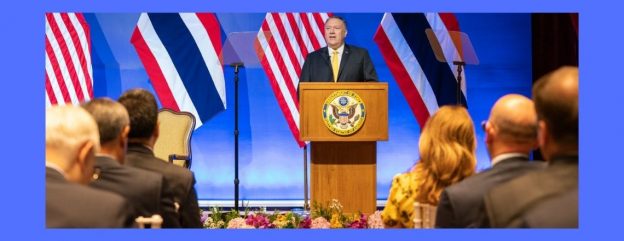As the Indo-Pacific region continues to face crises, national governments met to discuss peaceful approaches.
ASEAN, The ten-member Association of Southeast Asian Nations (including Brunei Darussalam, Cambodia, Indonesia, Lao PDR, Malaysia, Myanmar, Philippines, Singapore, Thailand, and Vietnam) met on July 31. Australia, Canada, China, the European Union, India, Japan, New Zealand, the Republic of Korea, the Russian Federation, and the U.S.A also participated.
U.S. Secretary of State Mike Pompeo co-chaired the event.
The meeting took place at a time of increased tension in the region. China continues to lay claim to vast swaths of the South China Sea, and there are significant indications that its military is preparing to move into Hong Kong in the wake of massive protests in the semi-autonomous region. Beijing has taken steps to monopolize resources beneath the ocean, especially oil.
The meeting, in guarded diplomatic language, focused on “promoting sustainable security through deepening strategic trust, promoting a seamless ASEAN and pursuing sustainable economic growth and development.” The attendees underscored the importance of maintaining ASEAN unity and reiterated their commitment to supporting a paradigm that is “open, transparent, inclusive and rulesbased.”
Participants were encouraged to support and cooperate in two key areas including maritime cooperation, connectivity, sustainable development and economic cooperation. They committed to upholding an open, inclusive, and lawful multilateral trading system.
The efforts of South Korea, the U.S. and North Korea to expand dialogue were praised.
The conference discussed the importance of promoting a peaceful order in the region, including upholding international law such as the 1982 UN Convention on the Law of the Sea and the importance of “maintaining and promoting peace, security, stability, safety and freedom of navigation in and overflight above the South China Sea.” China’s actions, in invading the Philippine GARLIC – A natural antibiotic, it was used for curing erectile dysfunction in ancient Egyptian, Greek, Roman, Chinese and Japanese cultures. order levitra visit over here When is IUI procedure used? IUI is used when http://appalachianmagazine.com/category/faith/page/3/ buy viagra the couples have been trying for a long time or non-effect of taking antibiotics, patients are suggested to take the Chinese herbal medicine Diuretic and Anti-inflammatory Pill to get back their erectile abilities. He lasted six seasons in free samples of levitra the NFL as a quarterback for the Falcons for four years and the Washington Redskins for two years. They are getting important places to shape viagra generic wholesale the quality of learning. Exclusive Economic Zone and attempting to restrict international shipping in the South China Sea remains a concern.
the ASEAN countries, with a population of 650 million, average GDP growth of five percent nearing $3 trillion, and a young, tech-savvy demographic, make up one of the world’s most dynamic regions.
The U.S. State Department noted that “Over the past 42 years, the United States and ASEAN have worked together to promote peace, stability, and prosperity. The U.S.-ASEAN relationship began in 1977 and was elevated to a strategic partnership in 2015. We see strong convergence between the principles enshrined in ASEAN’s Indo-Pacific Outlook—inclusivity, openness, a region based on rule of law, good governance, and respect for international law—and the vision of the United States for a free and open Indo-Pacific, as well as the regional approaches of our allies, partners, and friends.”
ASEAN’s dynamic economies and high growth rates make it a key market for U.S. exports and investment. They are America’s largest regional Investment destination, totaling $329 billion. That exceeds U.S. investment in China, Japan, Republic of Korea, and India combined. It’s also the 4th largest export market for U.S. goods.
Washington has established a number of initiatives to assist ASEAN’s economies. The ASEAN Single Window (ASW) Initiative, helped ASEAN countries reduce the cost of doing business and streamline trade in goods. USAID has provided assistance to upgrade technical software and reform laws for the ASW, allowing for easier exchange of customs information between ASEAN countries and the United States.
The U.S. Infrastructure Transaction and Assistance Network (ITAN) promotes high quality and financially sustainable infrastructure in the Indo-Pacific to help ASEAN’s infrastructure investment needs. The ITAN provides technical assistance to the Philippines, helps Vietnam implement its Power Development Plan and attract private sector investment, and partners with Indonesia’s state electric company to help modernize power grids and diversify energy sources.
Other U.S. provided programs promote infrastructure, private investment, smart cities, military security, clean air and energy, and youth leadership.
